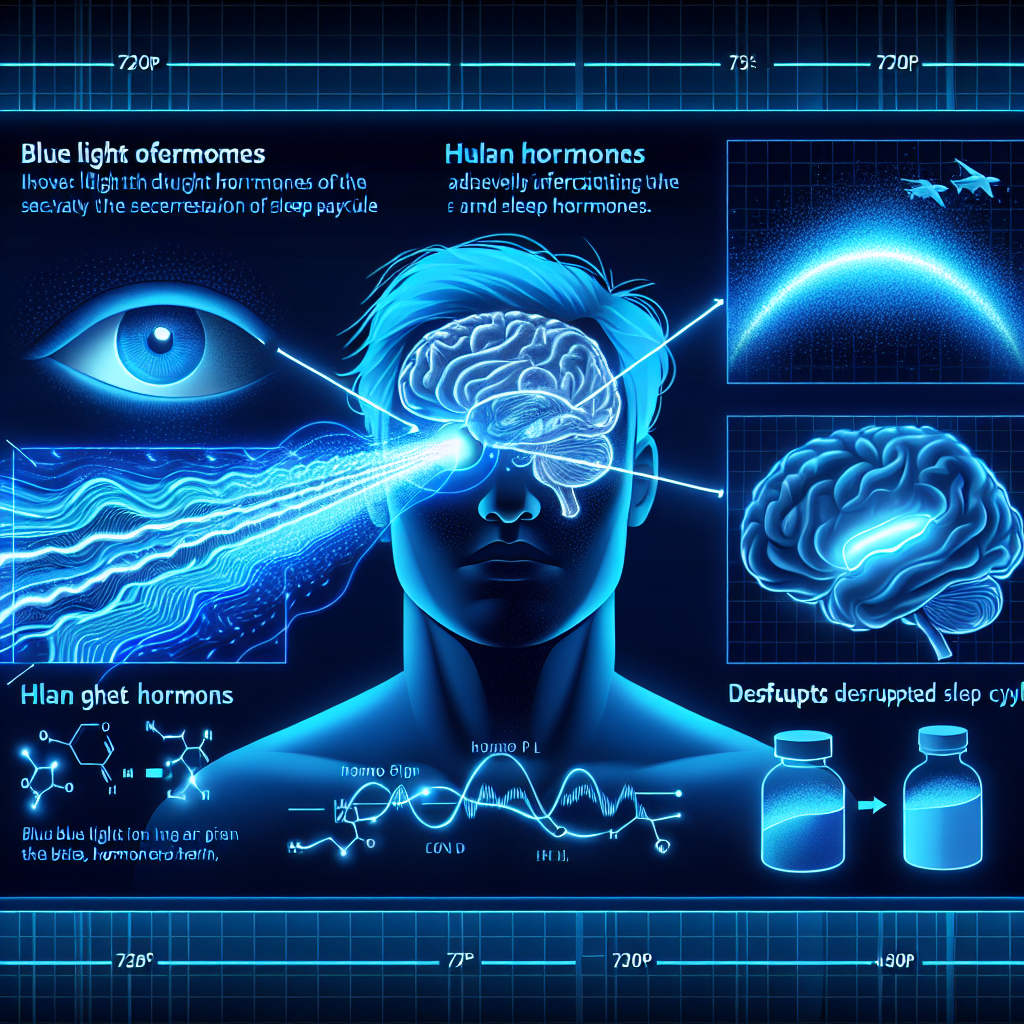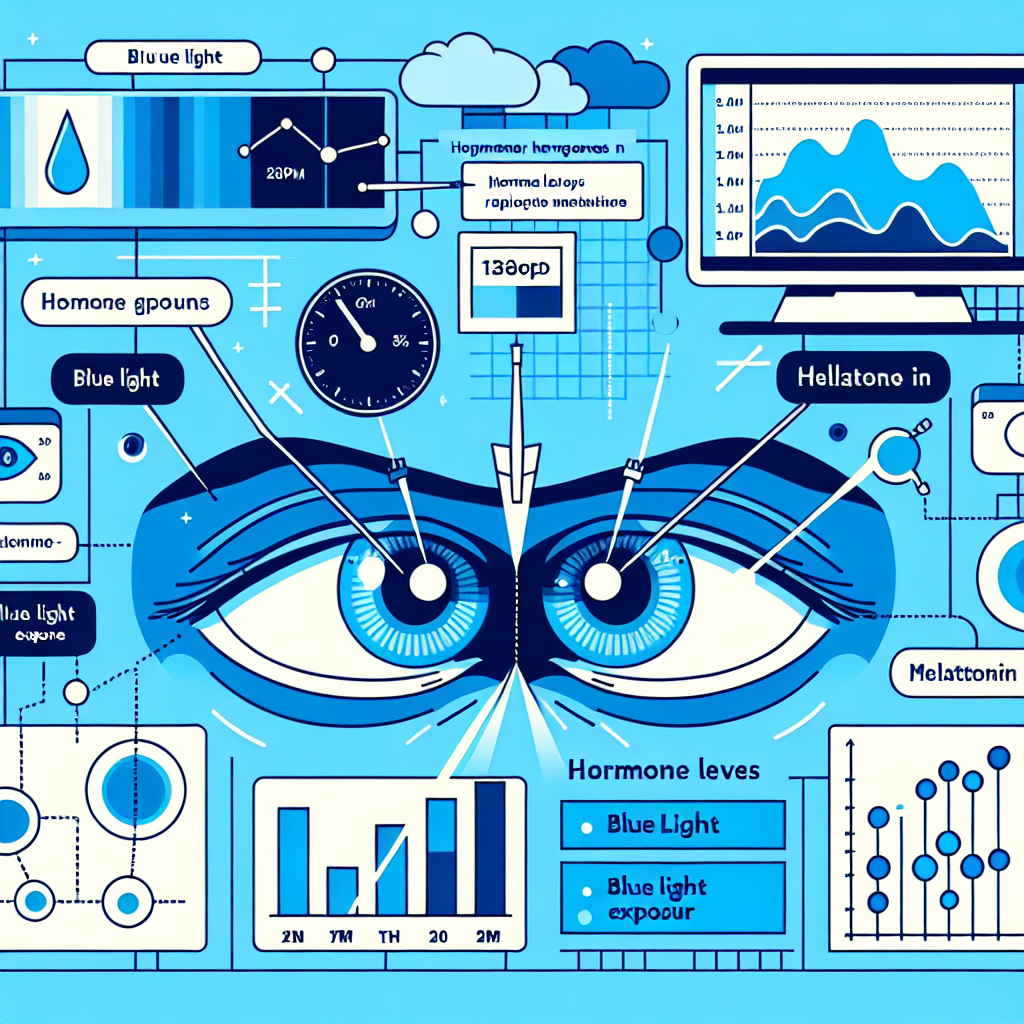How Blue Light Affects Your Hormones and Sleep

Discover how blue light affects your hormones and sleep. Learn more about the impact and how to protect yourself. Visit My Vibrant Vitality now.
Understanding the Impact of Blue Light on Your Sleep and Hormonal Balance
Blue light, a type of light that is most commonly emitted by screens on electronic devices, has been a topic of increasing interest in recent years. This is due to its potential impact on our sleep patterns and hormonal balance. As we become more reliant on technology in our daily lives, it’s important to understand how this exposure to blue light can affect our overall health.
Blue light is part of the visible light spectrum and can be beneficial during daylight hours as it boosts attention, reaction times, and mood. However, exposure to blue light in the evening can have a different effect. It can disrupt our circadian rhythm, the body’s internal clock that regulates sleep and wakefulness over a 24-hour cycle. This disruption can lead to difficulty falling asleep, poor sleep quality, and daytime fatigue.
The primary hormone affected by blue light is melatonin, a hormone that plays a crucial role in sleep regulation. Melatonin is produced by the pineal gland in the brain and its production is influenced by the light-dark cycle. During the day, when light exposure is high, melatonin production is low. As darkness falls, melatonin production increases, signaling to the body that it’s time to sleep.
However, exposure to blue light, especially in the evening, can trick the brain into thinking it’s still daytime. This can suppress the production of melatonin, delaying sleep onset and disrupting sleep patterns. This disruption can have a ripple effect on other hormones as well. For instance, it can increase the production of cortisol, the body’s main stress hormone, which can further interfere with sleep and contribute to a range of health problems, including anxiety, depression, heart disease, and weight gain.
Moreover, research has shown that chronic exposure to blue light can also affect insulin, the hormone that regulates blood sugar levels. This can increase the risk of metabolic disorders like obesity and type 2 diabetes.
Given these potential impacts, it’s important to manage our exposure to blue light. One way to do this is by limiting the use of electronic devices in the evening. If this is not possible, consider using blue light blocking glasses or installing apps that filter out blue light on your devices.
In addition, maintaining a regular sleep schedule can help regulate your circadian rhythm and hormone production. This means going to bed and waking up at the same time every day, even on weekends. Regular exposure to natural light during the day can also help regulate your circadian rhythm and boost your mood and alertness.
In conclusion, while blue light can have beneficial effects during the day, excessive exposure, especially in the evening, can disrupt sleep and hormonal balance. By understanding the impact of blue light and taking steps to manage our exposure, we can help protect our sleep and overall health. As we continue to navigate a world increasingly reliant on technology, this understanding becomes even more crucial.
The Science Behind Blue Light and Its Effects on Your Sleep Cycle

Blue light, a type of light that is most commonly emitted by screens on electronic devices, has been a topic of increasing interest in the scientific community. This is due to its potential effects on our hormones and sleep patterns. The science behind blue light and its effects on your sleep cycle is fascinating and worth understanding, especially in our technology-driven world.
Blue light is part of the visible light spectrum, and it has a shorter wavelength and higher energy compared to other types of light. It is naturally produced by the sun, but it is also emitted by artificial sources such as smartphones, tablets, computers, and LED lights. While exposure to blue light during the day can have positive effects, such as boosting attention and mood, excessive exposure at night can disrupt our sleep cycle.
The human body operates on a 24-hour cycle known as the circadian rhythm. This internal clock regulates various physiological processes, including sleep-wake cycles, hormone production, and cell regeneration. One of the key hormones involved in this process is melatonin, often referred to as the “sleep hormone”. Melatonin is produced by the pineal gland in the brain and its production is influenced by light exposure. During the day, light exposure suppresses melatonin production, promoting alertness and wakefulness. As night falls, melatonin production increases, signaling to the body that it’s time to sleep.
However, the advent of artificial lighting and electronic devices has significantly altered our light exposure patterns. In particular, the blue light emitted by these devices can trick our brains into thinking it’s still daytime, even late at night. This is because blue light is very effective at suppressing melatonin production. When we use our devices in the evening, the blue light they emit can interfere with our body’s preparation for sleep, leading to difficulties falling asleep and poor sleep quality.
Moreover, chronic exposure to blue light at night can disrupt our circadian rhythm, leading to a condition known as circadian rhythm disorder. This disorder is characterized by persistent sleep disturbances and can have serious health consequences, including increased risk of cardiovascular disease, obesity, and depression.
The good news is that there are several strategies we can employ to mitigate the effects of blue light on our sleep. One simple solution is to limit screen time in the evening and avoid using electronic devices for at least one hour before bedtime. Another strategy is to use blue light filters on our devices or wear blue light blocking glasses in the evening. These filters and glasses are designed to block or absorb the blue light, reducing its impact on our sleep.
In conclusion, while blue light is an integral part of our modern lives, it’s important to be mindful of its potential effects on our sleep and overall health. By understanding the science behind blue light and its impact on our sleep cycle, we can make informed decisions about our technology use and take steps to protect our sleep. After all, a good night’s sleep is essential for our well-being and productivity.
How Blue Light Interference Can Disrupt Your Hormones and Sleep Patterns
Blue light, a type of light that is most commonly emitted by screens on electronic devices, has been a topic of increasing interest in recent years. This is due to its potential impact on our health, particularly in relation to our hormones and sleep patterns. The human body is a complex system that relies on a delicate balance of hormones to function optimally. One of these hormones, melatonin, plays a crucial role in regulating our sleep-wake cycle, also known as our circadian rhythm. However, exposure to blue light, especially in the evening, can disrupt this balance and lead to a range of health issues.
The relationship between blue light and our hormones is rooted in our evolutionary history. Our ancestors lived in sync with the natural light-dark cycle of the sun, waking with the sunrise and sleeping after sunset. This pattern of behavior was regulated by the production of melatonin, which is naturally produced in the brain’s pineal gland. As the sun sets and darkness falls, melatonin production increases, signaling to our bodies that it’s time to sleep. Conversely, as the sun rises and light increases, melatonin production decreases, signaling that it’s time to wake up.
However, in our modern world, we are exposed to artificial light sources after sunset, particularly blue light from electronic devices like smartphones, tablets, and computers. This exposure to blue light can trick our brains into thinking it’s still daytime, suppressing the production of melatonin and disrupting our sleep-wake cycle. This disruption can lead to difficulty falling asleep, poor quality sleep, and daytime fatigue.
Moreover, the impact of blue light on our hormones and sleep patterns can have far-reaching effects on our overall health. Poor sleep has been linked to a range of health issues, including obesity, diabetes, cardiovascular disease, and even certain types of cancer. It can also affect our mental health, contributing to conditions like depression and anxiety.
Furthermore, blue light exposure can also affect other hormones in our bodies. For instance, it can increase the production of cortisol, a hormone that is associated with stress. High levels of cortisol can lead to a range of health issues, including weight gain, high blood pressure, and a weakened immune system.
So, what can we do to mitigate the effects of blue light on our hormones and sleep patterns? One simple solution is to limit our exposure to blue light in the evening. This can be achieved by setting a digital curfew, where we turn off all electronic devices a couple of hours before bedtime. Alternatively, we can use blue light blocking glasses or install apps on our devices that filter out blue light.
In conclusion, while our modern lifestyle has brought many conveniences, it has also introduced new challenges to our health. Blue light exposure from electronic devices can disrupt our hormones and sleep patterns, leading to a range of health issues. By being mindful of our exposure to blue light, particularly in the evening, we can help to maintain the delicate balance of hormones in our bodies and promote better sleep and overall health.